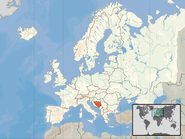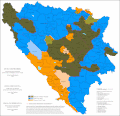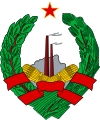Our website is made possible by displaying online advertisements to our visitors.
Please consider supporting us by disabling your ad blocker.
Portal:Bosnia and Herzegovina
Welcome to the Bosnia and Herzegovina Portal
 |
 |

| |
Bosnia and Herzegovina (Serbo-Croatian: Bosna i Hercegovina, Босна и Херцеговина), sometimes known as Bosnia-Herzegovina and informally as Bosnia, is a country in Southeast Europe, situated on the Balkan Peninsula. It borders Serbia to the east, Montenegro to the southeast, and Croatia to the north and southwest. In the south it has a 20-kilometre-long (12-mile) coast on the Adriatic Sea, with the town of Neum being its only access to the sea. Bosnia has a moderate continental climate with hot summers and cold, snowy winters. In the central and eastern regions, the geography is mountainous, in the northwest it is moderately hilly, and in the northeast it is predominantly flat. Herzegovina, the smaller, southern region, has a Mediterranean climate and is mostly mountainous. Sarajevo is the capital and the largest city.
The area has been inhabited since at least the Upper Paleolithic, but evidence suggests that during the Neolithic age, permanent human settlements were established, including those that belonged to the Butmir, Kakanj, and Vučedol cultures. After the arrival of the first Indo-Europeans, the area was populated by several Illyrian and Celtic civilizations. The ancestors of the South Slavic peoples that populate the area today arrived during the 6th through the 9th century. In the 12th century, the Banate of Bosnia was established; by the 14th century, this had evolved into the Kingdom of Bosnia. In the mid-15th century, it was annexed into the Ottoman Empire, under whose rule it remained until the late 19th century; the Ottomans brought Islam to the region. From the late 19th century until World War I, the country was annexed into the Austro-Hungarian monarchy. In the interwar period, Bosnia and Herzegovina was part of the Kingdom of Yugoslavia. After World War II, it was granted full republic status in the newly formed Socialist Federal Republic of Yugoslavia. In 1992, following the breakup of Yugoslavia, the republic proclaimed independence. This was followed by the Bosnian War, which lasted until late 1995 and ended with the signing of the Dayton Agreement.
The country is home to three main ethnic groups: Bosniaks are the largest group, Serbs the second-largest, and Croats the third-largest. Minorities include Jews, Roma, Albanians, Montenegrins, Ukrainians and Turks. Bosnia and Herzegovina has a bicameral legislature and a three-member presidency made up of one member from each of the three major ethnic groups. However, the central government's power is highly limited, as the country is largely decentralized. It comprises two autonomous entities—the Federation of Bosnia and Herzegovina and Republika Srpska—and a third unit, the Brčko District, which is condominium of both entities, but governed by its own local government.
Bosnia and Herzegovina is a developing country and ranks 74th in the 2018 Human Development Index. Its economy is dominated by industry and agriculture, followed by tourism and the service sector. Tourism has increased significantly in recent years. The country has a social-security and universal-healthcare system, and primary and secondary level education is free. It is a member of the United Nations, the Organization for Security and Co-operation in Europe, the Council of Europe, the Partnership for Peace, and the Central European Free Trade Agreement; it is also a founding member of the Union for the Mediterranean, established in July 2008. Bosnia and Herzegovina is an EU candidate country and has also been a candidate for NATO membership since April 2010. (Full article...)
Selected article -
The Serbs of Bosnia and Herzegovina (Serbian Cyrillic: Срби Босне и Херцеговине, romanized: Srbi Bosne i Hercegovine), often referred to as Bosnian Serbs (Serbian Cyrillic: босански Срби, romanized: bosanski Srbi) or Herzegovinian Serbs (Serbian Cyrillic: херцеговачки Срби, romanized: hercegovački Srbi), are native and one of the three constituent nations of the country, predominantly residing in the political-territorial entity of Republika Srpska. Most declare themselves Eastern Orthodox Christians and speakers of the Serbian language.
Serbs have a long and continuous history of inhabiting the present-day territory of Bosnia and Herzegovina, and a long history of statehood in this territory. Slavs settled the Balkans in the 7th century and the Serbs were one of the main tribes who settled the peninsula including parts of modern-day Herzegovina. Parts of Bosnia were ruled by the Serbian prince Časlav in the 10th century before his death in 960. The territories of Duklja, including Zeta and Zachlumia were later consolidated into a Serbian Kingdom before its fall in 1101. In the second half of the 12th century, Bosnia and Herzegovina was ruled by the Nemanjić dynasty. Stephen Tomašević ruled briefly as Despot of Serbia in 1459 and as King of Bosnia between 1461 and 1463. (Full article...)
General images
More did you know
- ... that to receive a work permit to play in Luxembourg, Bosnian footballer Sanel Ibrahimović had to pretend to be a specialist in his country's cuisine?
Cities
- Banja Luka
- Bihać
- Berkovići
- Bijeljina
- Bosanska Krupa
- Bosanski Petrovac
- Brčko
- Brod
- Bugojno
- Cajnice
- Cazin
- Derventa
- Doboj
- Donji Vakuf
- Dubica
- Foča
- Goražde
- Gornji Vakuf
- Gračanica
- Gradačac
- Gradiška
- Ilidža
- Istočno Sarajevo
- Jajce
- Jablanica
- Kakanj
- Kalesija
- Konjic
- Kotor Varoš
- Laktaši
- Livno
- Ljubuški
- Lukavac
- Modriča
- Mostar
- Nevesinje
- Neum
- Novi Grad
- Novi Travnik
- Olovo
- Petrovo
- Prijedor
- Prnjavor
- Sanski Most
- Sarajevo
- Srebrenik
- Srebrenica
- Teslić
- Tešanj
- Travnik
- Trebinje
- Tuzla
- Velika Kladuša
- Visoko
- Vitez
- Zavidovići
- Zenica
- Zvornik
- Živinice
- Žepče
Selected biography -

Mladen Lorković (Croatian pronunciation: [mlâden lǒːrkoʋit͡ɕ]; 1 March 1909 – April 1945) was a Croatian politician and lawyer who became a senior member of the Ustaše and served as the Foreign Minister and Minister of Interior of the Independent State of Croatia (NDH) during World War II. Lorković led the Lorković-Vokić plot, an attempt to establish a coalition government between the Ustaše and the Croatian Peasant Party and align the Independent State of Croatia with the Allies.
As a student, he joined the Croatian Party of Rights but, viewed as a dissident in the Kingdom of Yugoslavia, he fled the country to avoid arrest and eventually settled in Germany where he obtained a doctorate in law at the University of Berlin. In 1934, he joined the Ustaše and became a close associate of Ante Pavelić. Although he was initially commander of all Ustaše in Germany, where he sought support in creating and protecting a Croatian state, he later became leader of all Ustaše outside Italy. Soon after the establishment of the NDH, he was appointed as Foreign Minister and strongly opposed Italian influence on the state. After his cabinet chief, Ivo Kolak, was executed in 1943 for smuggling gold, Lorković was removed from office but later named Minister of Interior. As Minister of Interior, he negotiated with the Croatian Peasant Party (HSS) in the hopes of establishing a coalition government. He also held secret negotiations with HSS representatives to propose having the NDH join the Allies against Germany. Although he apparently had the support of Pavelić, he and his cohorts were soon arrested as conspirators against the state and after a period in detention was executed at the end of April 1945 alongside Ante Vokić. (Full article...)
List of selected biographies
|
|---|
Did you know (auto-generated)

- ... that Ivan Ančić was the first Bosnian Franciscan to use the Latin script to write in his native language?
Subcategories
Related portals
Religions in Bosnia and Herzegovina
Ex-Yugoslav countries
Other countries
Topics
Recognized content
Things you can do

- Request images:
- Request maps:
- Sarajevo city location map
- Articles wanted:
- Clinical Center University of Sarajevo (Koševo hospital);
- Articles needing major work, Be Bold!: **
- Architecture of Bosnia and Herzegovina
- Health in Bosnia and Herzegovina
- Literature of Bosnia and Herzegovina
- List of universities in Bosnia and Herzegovina
- Foreign relations of Bosnia and Herzegovina
- Cinema of Bosnia and Herzegovina
- Subpages of List of settlements in the Federation of Bosnia and Herzegovina
- Stubs needing expansion:
- Featured Portals:
- Featured Pictures:
- Articles with Featured Article Candidate's status within reach:
- Current Featured Candidates:
- Featured Articles: (Don't be too bold!)
- Current Good Article Candidates:
- Good Articles:
- Former Good Articles:
Web resources
- B&H Tourism - Official Web Site
- Tourism Association of the Federation of Bosnia and Herzegovina - Official Web Site
- Tourism Association of Republika Srpska - Official Web Site
- Duga-Tehna
Other links:
- Bosnian National Monument - Muslibegovica House
- "Bosnia and Herzegovina". The World Factbook (2025 ed.). Central Intelligence Agency.
- Bosnia & Herzegovina Economy
- Bosnia and Herzegovina Map
- Bosnia News
- rjecnik.ba English-Bosnian and German-Bosnian On-line Dictionary (in Bosnian, English, and German)
- The State of Media Freedom in Bosnia and Herzegovina: The Public Service Broadcasting Report by the OSCE Representative on Freedom of the Media
Associated Wikimedia
The following Wikimedia Foundation sister projects provide more on this subject:
-
Commons
Free media repository -
Wikibooks
Free textbooks and manuals -
Wikidata
Free knowledge base -
Wikinews
Free-content news -
Wikiquote
Collection of quotations -
Wikisource
Free-content library -
Wikiversity
Free learning tools -
Wikivoyage
Free travel guide -
Wiktionary
Dictionary and thesaurus
Previous Page Next Page
بوابة:البوسنة والهرسك Arabic Portal:Bosna i Hercegovina BS Portál:Bosna a Hercegovina Czech Portal:Bosnien und Herzegowina German Portal:Bosnia y Herzegovina Spanish Portail:Bosnie-Herzégovine French Պորտալ:Բոսնիա և Հերցեգովինա HY Portale:Bosnia ed Erzegovina Italian Портал:Босния және Герцеговина KK Портал:Босна и Херцеговина MK





















































































